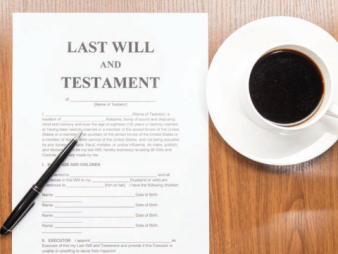Your loved one chose you as executor for a reason, and it’s a responsibility that you shouldn’t take lightly. Read on to learn about your responsibilities as an estate executor.
The term “executor” sounds important, doesn’t it? Well, it is – and for good reason. An executor is a person identified to carry out the will or estate of an individual who has passed away. And if you know anything about estates and wills, you may know that being an executor comes with great responsibility.
If you ever find yourself named as an executor of a loved one’s estate, it’s your duty to assess and protect assets, pay creditors, notify beneficiaries, file a final tax return, and much more. The process is multi-faceted and lengthy, and could take up to a year to finalize. Bottom line – your loved one chose you as executor for a reason, and it’s a responsibility that you shouldn’t take lightly.
Responsibilities Of An Executor
OK, so you know that an executor has a lot of responsibilities. Check out this list that outlines some of the duties you can expect to be responsible for as an executor:
- Collect all applicable documents, including copies of the deceased’s will, trust documents, bank and mortgage statements, and any other documentation detailing assets and liabilities of the estate. You’ll also want to ensure you have plenty of official copies of the death certificate to present as needed.
- Work with the deceased’s CPA or financial advisor to identify all financial accounts belonging to the deceased, including bank accounts, life insurance policies, deeds/titles, etc. Reviewing the person’s last tax return is often a good starting point to determine their assets. Depending on whether a beneficiary was identified, the assets will either be paid by contract or distributed through probate court.
- Evaluate and pay all outstanding bills as appropriate. Creditors may collect debt within six months of death, and it will be your responsibility as executor to ensure these debts are approved or rejected. You will want to open an estate checking account from which to pay these bills, accept monies owed to the estate, pay specific bequests and distribute certain items.
- File the deceased’s final tax returns. It may be helpful to enlist the help of an accountant to ensure the appropriate returns are filed in the correct timeframe. Failure to file these returns on time could lead to personal liability for the executor.
- Meet all other legal and financial responsibilities. You’ll probably want to hire an estate attorney.
Carrying out a loved one’s wishes can be complicated – enlisting the help of trusted advisors and estate professionals to guide you through the process will be an integral key to success.
Want to learn more? Check out episode 6, “The Grim Reaper Is Coming (And He Wants Your Money)” on unsuitable on Rea Radio. This episode will give you some expert tips and insight from estate planning expert Dave McCarthy, CPA, CSEP.
By Inez Bowie, CPA, CSEP (Marietta office) & Amy Demlow, JD, MTax, Critchfield, Critchfield & Johnston, Ltd. (Medina office)
This article was originally published in the Spring 2016 edition of The Rea Report, Rea & Associate’s quarterly print newsletter.




